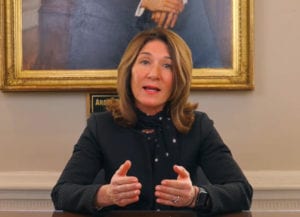Who is a member?
Our members are the local governments of Massachusetts and their elected and appointed leadership.

Lt. Gov. Karyn Polito addresses local leaders during the virtual MMA Annual Meeting & Trade Show on Jan. 21.
Speaking to more than 800 local leaders from across the state during the MMA Annual Meeting & Trade Show this morning, Lt. Gov. Karyn Polito announced that the administration’s state budget plan for fiscal 2022, set to be released next Wednesday, will increase general municipal aid by 3.5%.
This meets the administration’s commitment to increase the Unrestricted General Government Aid account at the same rate as the projected growth in state revenues. The consensus projection of 3.5% was announced by legislative and administration budget writers late last week.
The $39.5 million increase would push the UGGA account to $1.17 billion.
“Our budget recommendation will continue the strong support for cities and towns that our administration has made a priority since entering office [in 2015],” Polito said.
(At a workshop later in the day, Administration and Finance Secretary Mike Heffernan added that the roughly $45 billion budget will draw on the state’s stabilization fund and won’t have any “negative surprises for our partners in cities and towns.” No word as yet on Chapter 70 education aid.)
Community One Stop for Growth
Polito also announced a new unified grant application program designed to simplify access to 10 of the most popular integrated grant programs across several state entities.
Community One Stop for Growth consolidates grant applications in one online location, allowing applicants to save time and effort by having their application considered for multiple grant programs simultaneously.
Community One Stop can be used to apply for the following grant programs:
• MassWorks
• Urban Agenda
• 43D Expedited Permitting
• Community Planning Grants
• Rural Development Fund
• Housing Choice
• Massachusetts Downtown Initiative
• Brownfields
• Site Readiness
• Underutilized Properties
Polito said the new process begins with an optional – “but highly recommended” – expression of interest, open now through the beginning of April. Local officials will be able to submit summaries for up to five project ideas, and teams from a range of state agencies will provide feedback to help strengthen the proposals and offer guidance for completing full applications, which will be due in June.
The administration plans to host three webinars, on Jan. 28, Feb. 2 and Feb. 4, to explain the new process. The webinars will also be posted at mass.gov/onestop, along with program details. (Invites are going out to municipal CEOs for an MMA-sponsored webinar on Jan. 27.)
“We hope this new streamlined application will make it easier to get your communities the resources you need to succeed both in your [pandemic] recovery and far into the future,” Polito said.
Housing and economic development
Polito reiterated that housing production remains a priority for the administration and a key to its economic development strategy. The administration has set a goal of producing 135,000 new units by 2035.
She thanked local officials for their help and support in passing the Housing Choices Act, which was included in the economic development package signed last week by the governor. Housing Choices changes state law to reduce the vote threshold needed to adopt certain zoning changes, from two-thirds to a simple majority.
Polito said the economic development package, which the governor filed last March and then reworked in late June to address pandemic needs, includes $10 million for climate-resilient affordable housing production.
She highlighted the following elements of the $626 million multi-year bond package:
• $40 million for revitalization of underused properties
• $15 million for site readiness
• $10 million for regional and community assistance planning
• $20 million for a new Rural and Small Town Development Fund
• $5 million for maintenance of broadband infrastructure in central and western Massachusetts
Given the negative impact of the pandemic on local businesses, Polito said the administration is “prioritizing supporting the businesses that define our main streets.”
In December, the administration announced a $668 million small business relief package to help the hardest-hit main street and downtown small businesses with grants that will be administered through the Massachusetts Growth Capital Corporation. The Small Business Relief Fund has provided $195 million in direct support to more than 4,100 small businesses.
Polito also mentioned the multi-year transportation bond law signed by the governor on Jan. 15, which includes funding for a number of municipal grant programs, including a new Municipal Pavement Partnership Program and Local Bottleneck Reduction Program as well as the popular Municipal Small Bridge Program and Complete Streets program.
Polito noted how the COVID-19 pandemic had strengthened the bonds between state and local government, and how new forums have been established for idea exchange – particularly the frequent conference calls convened by the MMA for state and local leaders – with concrete results.
“We are fortunate to have a strong line of connection with local officials,” she said. “As former local officials, [the governor and I] know you know your communities best.”
She added that, “The pandemic has made the role of government even more important, especially at the local level.”
Polito noted that the administration has created a number of grant and technical assistance programs intended to facilitate and improve local government operations, beginning with the Community Compact Cabinet, and continues to look for new ways to support the needs of municipalities.
“We have worked to transform the role of state government from just a source of funding to more of a partner in local economic development,” she said.
In closing, Poilito thanked local leaders for “your tireless advocacy on behalf of your communities,” and said she and the governor recognize that “the success of our Commonwealth depends on the success of all 351 cities and towns.”